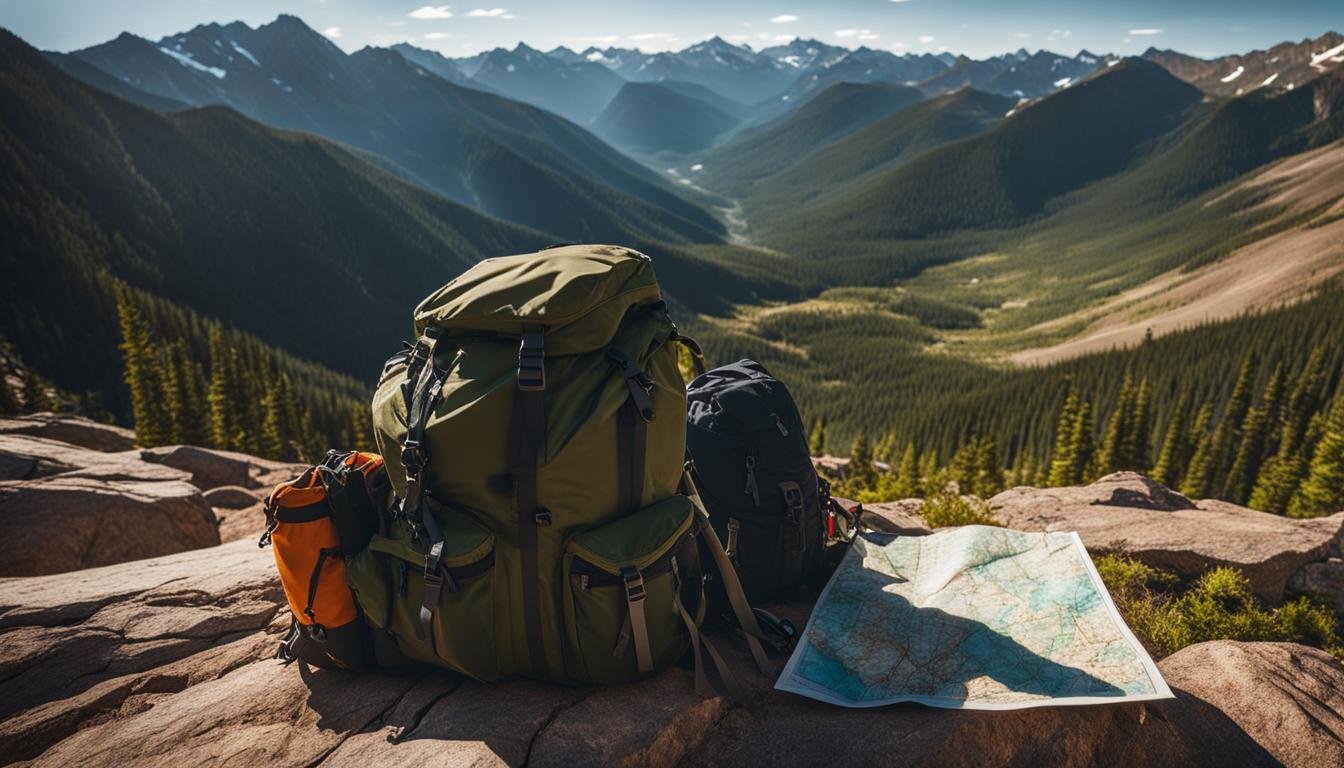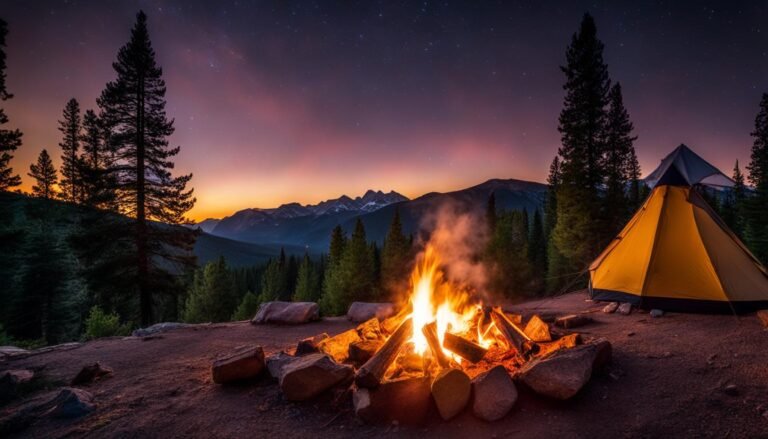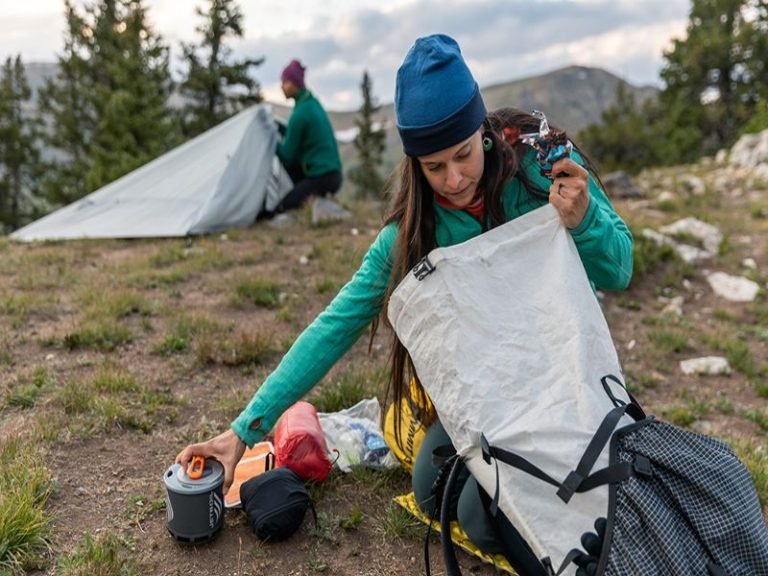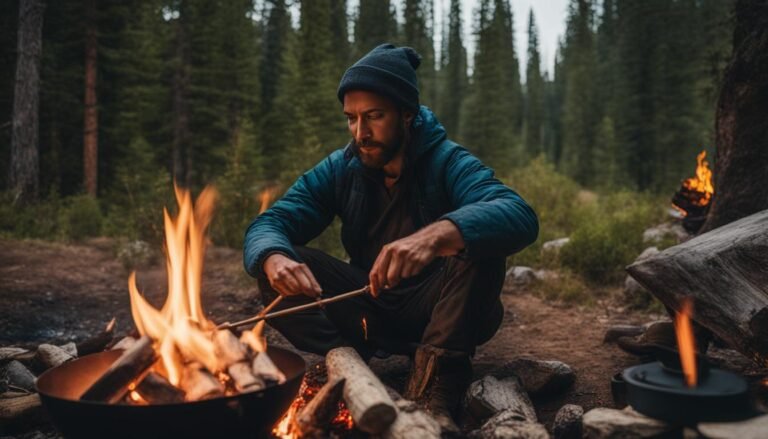How to Prepare for Hiking in Colorado
Hiking in Colorado offers breathtaking views and exciting adventures. However, it’s important to be well-prepared to ensure a safe and enjoyable experience. With high elevations and unpredictable weather, you need to take certain precautions before hitting the trails. Here are some tips to help you prepare for hiking in Colorado.
Key Takeaways:
- Acclimate to the altitude to prevent altitude sickness.
- Pack the right gear, including sturdy hiking boots and layers for changing weather.
- Plan your hikes carefully, familiarize yourself with the trail, and share your plans with someone.
- Stay hydrated and fuel up with nutritious snacks before and during the hike.
- Take safety precautions, carry a first aid kit, and be aware of altitude sickness symptoms.
Tips for Beginner Hikers in Colorado
Are you a beginner hiker looking to explore the beautiful trails of Colorado? Here are some essential tips to ensure a safe and enjoyable experience.
Start with Easy Hikes
Colorado has a wide range of hiking trails, so it’s important to start with easy hikes that are suitable for beginners. Look for trails with lower elevation gains and shorter distances to gradually build your stamina and confidence.
Pack the Right Gear
Having the right gear is crucial when hiking in Colorado. Invest in a pair of sturdy hiking boots that provide ankle support and traction. Layer your clothing to adapt to changing weather conditions and pack essentials like sunscreen, a hat, sunglasses, and a rain jacket. Don’t forget to bring a well-prepared backpack with water, snacks, a map, and a compass.
Be Mindful of Altitude
Colorado’s high elevation can take a toll on your body, especially if you’re not accustomed to it. Take it slow and acclimate to the altitude by spending a day or two in a higher elevation town before hitting the trails. Stay hydrated by drinking plenty of water and listen to your body. If you experience symptoms of altitude sickness, such as dizziness or shortness of breath, descend to a lower elevation and seek medical attention if needed.
| Must-Have Gear for Beginner Hikers in Colorado | Item |
|---|---|
| 1 | Hiking Boots |
| 2 | Layered Clothing |
| 3 | Sunscreen |
| 4 | Rain Jacket |
| 5 | Map and Compass |
By following these tips, you’ll be well-prepared for your hiking adventures in Colorado. Remember to always prioritize safety, listen to your body, and enjoy the stunning natural beauty that this state has to offer.
Fueling Up and Eating Well
Before embarking on your hiking adventure in Colorado, it’s essential to fuel up with a healthy meal and pack nutritious snacks to keep your energy levels high throughout the day. Proper nutrition and hydration play a vital role in ensuring an enjoyable and safe hiking experience.
Start your day with a balanced meal that includes carbohydrates, protein, and healthy fats. Opt for foods like whole grains, lean proteins, fruits, and vegetables. These will provide sustained energy and help prevent fatigue during your hike. Don’t forget to hydrate well in advance by drinking plenty of water before hitting the trail.
When it comes to snacks, choose lightweight and nutrient-dense options that are easy to carry. Trail mix, granola bars, dried fruits, nuts, and jerky are excellent choices that provide a good balance of carbohydrates, proteins, and fats. These snacks will keep you fueled and satisfied during breaks on the trail.
Sample Healthy Hiking Snack Options:
- Trail Mix: A blend of nuts, dried fruits, and seeds.
- Granola Bars: Look for bars with whole grains, nuts, and natural sweeteners.
- Fresh Fruits: Pack lightweight fruits like apples, oranges, or grapes.
- Jerky: Opt for lean protein sources like beef or turkey jerky.
- Nut Butter Packets: Individual servings of nut butter for quick and easy fuel.
Remember to replenish your water supply regularly during the hike. Dehydration can lead to fatigue, dizziness, and other symptoms that can dampen your hiking experience. Carry a reusable water bottle or a hydration bladder to ensure you have enough water to stay hydrated throughout the day.
| Food Item | Calories | Protein (g) | Carbohydrates (g) | Fat (g) |
|---|---|---|---|---|
| Almonds (1 oz) | 162 | 6 | 6 | 14 |
| Apple (1 medium) | 95 | 0.5 | 25 | 0 |
| Beef Jerky (1 oz) | 116 | 9 | 3 | 7 |
| Granola Bar (1 bar) | 120-200 | 2-4 | 20-30 | 3-10 |
| Trail Mix (1 oz) | 120-150 | 2-4 | 10-15 | 8-10 |
By fueling up with nutritious meals and snacks and staying hydrated throughout your hike, you’ll have the energy and stamina to fully enjoy the breathtaking beauty of Colorado’s trails.
Tips for Dressing Appropriately and Checking the Weather
When hiking in Colorado, it’s essential to dress appropriately and be prepared for the ever-changing weather conditions. Here are some tips to help you stay comfortable and safe on the trail:
Layer Up
Colorado’s weather can be unpredictable, with temperature fluctuations throughout the day. Dressing in layers is key to adapting to changing conditions. Start with a moisture-wicking base layer to keep you dry and comfortable. Add insulating layers like fleece or a lightweight down jacket for warmth, and top it off with a waterproof and windproof outer shell to protect against rain, snow, and wind.
Choose the Right Footwear
Investing in a pair of sturdy hiking boots is crucial for tackling Colorado’s rocky and uneven terrain. Look for boots that provide ankle support, a durable outsole with good traction, and waterproof capabilities. Don’t forget to break in your boots before hitting the trails to avoid painful blisters or discomfort during your hike.
Check the Weather Forecast
Prior to your hike, always check the weather forecast for the area you’ll be exploring. Keep an eye out for any weather alerts or warnings that could affect your hike. Be prepared to adjust your plans accordingly, whether that means choosing a different trail or rescheduling your hike for a safer time. Remember, it’s better to be safe than sorry when it comes to extreme weather conditions.
| Essential Gear for Dressing Appropriately | Weather Conditions |
|---|---|
| Moisture-wicking base layer | Sunny and warm |
| Insulating layers (fleece or lightweight down jacket) | Cool and breezy |
| Waterproof and windproof outer shell | Rainy or snowy |
| Sturdy hiking boots | Rocky and uneven terrain |
By dressing appropriately and checking the weather before your hike, you’ll be well-prepared to handle the ever-changing conditions that Colorado’s beautiful trails have to offer. Remember to always prioritize safety and enjoy your hiking adventure!
Tips for Planning and Navigation
When it comes to hiking in Colorado, proper planning and navigation are key to ensuring a safe and enjoyable experience. Whether you’re a beginner or an experienced hiker, following these tips will help you make the most of your time on the trail.
Know the Trail
Before embarking on your hike, take the time to research and familiarize yourself with the trail. Read up on trail conditions, difficulty levels, and any potential hazards or closures. This will help you plan your route and determine the appropriate gear and supplies to bring.
Additionally, consider using hiking apps or carrying a physical map to aid in navigation. These tools can provide real-time information on your location, elevation, and distance traveled, ensuring you stay on track and avoid getting lost.
Share Your Plans
Always let someone know about your hiking plans, including the trail you’ll be on, your estimated time of return, and any alternative routes you may take. This information can be crucial in the event of an emergency or if you fail to check in as planned.
Be sure to provide this information to a trusted friend or family member who can assist search and rescue teams if needed. Consider using a hiking itinerary template to organize your plans and easily share them with others.
Carry Essential Navigation Tools
In addition to maps and hiking apps, carrying a compass is a simple yet important tool that can help you navigate the trails. A compass can provide you with a sense of direction, especially in areas with limited visibility or when there are no clearly marked trail signs.
Remember to take the time to learn how to use a compass properly before your hike to ensure you can effectively navigate your way to your destination. In combination with maps or hiking apps, a compass can provide an extra layer of confidence and security on the trail.
Overall, planning and navigation are essential aspects of hiking in Colorado. By knowing the trail, sharing your plans, and carrying essential navigation tools, you can have a safe and rewarding hiking experience in the beautiful wilderness of Colorado.
Safety Precautions and Altitude Sickness
When hiking in Colorado, it is essential to prioritize safety and be aware of potential risks, such as altitude sickness. By taking the necessary precautions, you can ensure a safe and enjoyable hiking experience. Here are some hiking safety tips and guidelines for dealing with altitude sickness in Colorado:
1. Acclimate to the Altitude
Colorado’s high elevations can pose a challenge for hikers who are not acclimated. It is important to give your body time to adjust to the thin air before attempting strenuous hikes. This can be done by spending a few days at lower elevations and gradually increasing your altitude over time. This will help prevent altitude sickness and allow your body to adapt to the lower oxygen levels.
2. Stay Hydrated
Proper hydration is crucial when hiking in Colorado. The dry climate and higher elevation can lead to increased water loss through sweat and respiration. It is recommended to drink plenty of water before, during, and after your hike to stay hydrated. Carrying a water bottle or hydration pack is essential to ensure you have easy access to water throughout your hike.
3. Recognize the Signs of Altitude Sickness
Altitude sickness can manifest with symptoms such as headache, dizziness, nausea, fatigue, and shortness of breath. It is important to pay attention to your body and recognize these signs. If you or a fellow hiker experience any severe or worsening symptoms, it is crucial to descend to lower elevations and seek medical attention if necessary.
4. Take Breaks and Listen to Your Body
Don’t push yourself too hard when hiking in Colorado. Take frequent breaks to rest, catch your breath, and allow your body to recover. Listen to your body’s signals and don’t hesitate to turn back or choose an easier trail if you’re not feeling well. It’s better to be cautious and prioritize your health and safety over reaching a specific destination.
| Altitude Sickness Symptoms | Altitude Sickness Prevention/Treatment |
|---|---|
| Headache | Drink plenty of water, descend to lower elevations if symptoms worsen |
| Dizziness | Rest, avoid sudden movements |
| Nausea | Hydrate, eat small and easily digestible meals |
| Fatigue | Take frequent breaks, ensure adequate rest |
| Shortness of breath | Rest, descend to lower elevations if symptoms worsen |
Remember, safety should always be your top priority when hiking in Colorado. By following these hiking safety tips and being mindful of altitude sickness, you can have a rewarding and memorable outdoor adventure in the beautiful Colorado wilderness.
Essential Gear and Equipment
When preparing for a hike in Colorado, it is crucial to have the right gear and equipment to ensure your safety and comfort on the trail. Here are some essentials that every hiker should consider:
1. Backpack:
A well-fitting backpack is essential for carrying all your hiking gear. Look for one with adjustable straps, multiple compartments, and a comfortable hip belt. Consider the capacity based on the length of your hikes and the amount of gear you need to carry.
2. Hiking Boots:
Invest in a pair of sturdy hiking boots that provide ankle support and have a good grip on various terrains. Make sure they are comfortable and properly broken in before hitting the trail.
3. Clothing Layers:
Colorado’s weather can change rapidly, so it’s important to dress in layers. Choose moisture-wicking and breathable fabrics that can keep you warm and dry. A base layer, insulating layer, and waterproof outer layer are recommended.
“Having the right gear can make all the difference during your hike. Choose high-quality items that are designed for outdoor activities and can withstand the rugged terrain and changing weather conditions of Colorado.”
4. First Aid Kit:
Carry a compact first aid kit that includes band-aids, antiseptic wipes, pain relievers, blister treatments, and any necessary medications. It’s essential to be prepared for any minor injuries or emergencies that may occur on the trail.
5. Other Essentials:
- Sunscreen to protect your skin from the intense Colorado sun.
- Bug repellent to ward off mosquitoes and other insects.
- A headlamp or flashlight for hikes that may extend into the evening.
Remember, being well-prepared with the right gear and equipment is essential for a safe and enjoyable hiking experience in Colorado’s breathtaking landscapes.
| Essential Gear | Description |
|---|---|
| Backpack | A well-fitting backpack with adjustable straps and multiple compartments. |
| Hiking Boots | Sturdy boots that provide ankle support and have good traction. |
| Clothing Layers | Moisture-wicking and breathable clothing to handle changing weather. |
| First Aid Kit | Compact kit with essentials like band-aids, pain relievers, and blister treatments. |
| Other Essentials | Sunscreen, bug repellent, and a headlamp or flashlight. |
Conclusion
Preparing for hiking in Colorado involves acclimating to the altitude, packing the right gear, and planning your hikes carefully. By following these tips and being mindful of safety precautions, you can have a rewarding and enjoyable hiking experience in the beautiful Colorado wilderness.
Colorado’s high elevations and unpredictable weather can make hiking challenging, but with the right preparation, you can conquer the trails with confidence. Start by acclimating to the altitude and gradually increasing the difficulty of your hikes. Make sure to pack essential gear such as sturdy hiking boots, proper clothing layers, and a well-prepared backpack.
Fueling up with a healthy meal and staying hydrated is crucial for maintaining energy levels throughout your hike. Carry nutritious snacks, extra food, and plenty of water to keep yourself fueled and hydrated. Colorado’s weather can change quickly, so dress in layers, wear moisture-wicking clothing, and carry a waterproof jacket to be prepared for any conditions.
Planning your hike and being familiar with the trail is key to a safe and enjoyable experience. Use hiking apps or carry a map for navigation, and share your hiking plans with someone for added safety. Additionally, be aware of the signs of altitude sickness and take precautions to prevent it. Acclimating to the altitude, drinking plenty of water, and having a first aid kit on hand are important safety measures.
FAQ
How do I prepare for hiking in Colorado?
To prepare for hiking in Colorado, it is important to acclimate to the altitude, pack the right gear, and plan your hikes carefully.
What should beginner hikers in Colorado know?
Beginner hikers in Colorado should start with easy hikes, gradually increase difficulty, and have the right gear, including sturdy hiking boots and proper clothing layers.
How should I fuel up and eat well before a hike?
Before a hike, it is important to have a healthy meal, pack nutritious snacks, and drink plenty of water to stay hydrated.
How should I dress and prepare for the weather in Colorado?
In Colorado, it is important to dress in layers, wear moisture-wicking clothing, sturdy hiking boots, and carry a waterproof jacket. Checking the weather forecast before the hike is also essential.
How should I plan and navigate for a hike in Colorado?
Before setting out, it is important to have a plan for the hike, be familiar with the trail, use hiking apps or carry a physical map for navigation, and share your hiking plans with someone.
What safety precautions should I take and how do I prevent altitude sickness?
Take precautions to prevent altitude sickness by acclimating to the altitude, drinking plenty of water, and taking breaks when needed. It is also important to carry a first aid kit and know basic first aid.
What gear and equipment do I need for hiking in Colorado?
Essential gear and equipment for hiking in Colorado include a well-fitting backpack, comfortable hiking boots, a first aid kit, sunscreen, bug repellent, and a headlamp.







